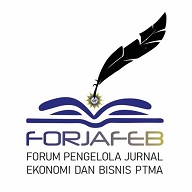Konsep diri dan Kinerja Pegawai: Studi Empirik pada Distrik Salawati Kabupaten Sorong
DOI:
https://doi.org/10.24269/asset.v5i1.4802Abstract Tujuan penelitian ini adalah untuk mengetahui pengaruh konsep diri terhadap kinerja pegawai di Distrik Salawati Kabupaten Sorong. Penelitian ini menggunakan Partial Least Squares (PLS) dengan Teknik Structural Equation Modeling (SEM) untuk menganalisis 44 Pegawai. Hasil Penelitian menunjukkan bahwa terdapat Pengaruh Positif dan Signifikan antara Konsep diri terhadap Kinerja Pegawai dengan Nilai T-statistik lebih besar dari T-tabel (T-statistik 3.909>T-tabel 1.680) pada taraf signifikansi 5% (0.05). Hasil Penelitian ini menunjukkan bahwa semakin tinggi konsep diri maka akan semakin meningkatkan kinerja pegawa di Distrik Salawati Kabupaten Sorong Papua Barat
Downloads
References
Beheshtifar, M., & Rahimi-Nezhad, Z. (2012). Role of self-concept in organizations. European Journal of Economics, Finance and Administrative Sciences, 44.
Chien, G. C. L., Mao, I., Nergui, E., & Chang, W. (2020). The effect of work motivation on employee performance: Empirical evidence from 4-star hotels in Mongolia. Journal of Human Resources in Hospitality and Tourism, 19(4). https://doi.org/10.1080/15332845.2020.1763766
Dr. A.A. Anwar Prabu Mangkunegara. (2013). Manajemen sumber daya Perusahaan. In Manajemen Sumber Daya.
Edgar, F. J., Zhang, J. A., & Geare, A. J. (2021). Situation, personality and performance: An exploration of moderators and mediators. Economic and Industrial Democracy, 42(3). https://doi.org/10.1177/0143831X18771493
Fernández-Bustos, J. G., Infantes-Paniagua, Ã., Cuevas, R., & Contreras, O. R. (2019). Effect of physical activity on self-concept: Theoretical model on the mediation of body image and physical self-concept in adolescents. Frontiers in Psychology, 10(JULY). https://doi.org/10.3389/fpsyg.2019.01537
Friedman, E. T., & Haaga, D. A. F. (2007). Using hierarchical classes to analyze organization of the self-concept. European Journal of Psychological Assessment, 23(1). https://doi.org/10.1027/1015-5759.23.1.9
Ghozali, I. (2011). Moderated Structural Equation Modeling. In Model persamaan struktural. Konsep dan aplikasi dengan program AMOS 19.0.
Karlen, Y., Hirt, C., & Stebner, F. (2021). Ability theories of self-regulated learning: the importance of implicit theories and ability self-concept for learning and academic performance. Unterrichtswissenschaft, 49(4). https://doi.org/10.1007/s42010-021-00131-w
Lapointe, É., Vandenberghe, C., ben Ayed, A. K., Schwarz, G., Tremblay, M., & Chenevert, D. (2020). Social Comparisons, Self-Conceptions, and Attributions: Assessing the Self-Related Contingencies in Leader-Member Exchange Relationships. Journal of Business and Psychology, 35(3). https://doi.org/10.1007/s10869-019-09628-9
Lo, A., & Abbott, M. J. (2019). Self-concept certainty in adaptive and maladaptive perfectionists. Journal of Experimental Psychopathology, 10(2). https://doi.org/10.1177/2043808719843455
Lüftenegger, M., Holzer, J., & Schober, B. (2021). Implicit theories of ability, academic self-concept and well-being in school. Unterrichtswissenschaft, 49(4). https://doi.org/10.1007/s42010-021-00130-x
Ma, C., Lin, X., Chen, (George) Zhen Xiong, & Wei, W. (2020). Linking perceived overqualification with task performance and proactivity? An examination from self-concept-based perspective. Journal of Business Research, 118. https://doi.org/10.1016/j.jbusres.2020.06.041
Mangkunegara, A. P. (2012). Evaluasi Kinerja SDM (Cetakan Keenam). In PT. Refika Aditama.
McConnell, A. R., Rydell, R. J., & Brown, C. M. (2009). On the experience of self-relevant feedback: How self-concept organization influences affective responses and self-evaluations. Journal of Experimental Social Psychology, 45(4). https://doi.org/10.1016/j.jesp.2009.03.011
Meggs, J., Ditzfeld, C., & Golby, J. (2014). Self-concept organisation and mental toughness in sport. Journal of Sports Sciences, 32(2). https://doi.org/10.1080/02640414.2013.812230
Nurjannah, H. (2019). Analisis Kompetensi terhadap Kinerja Pegawai Universitas. Journal of Economic, Bussines and Accounting (COSTING), 2(2). https://doi.org/10.31539/costing.v2i2.547
Perera, A. D. C., Samarakoon, S. M. A. K., & Wanninayake, W. M. C. B. (2021). Theoretical Linkage between Theories of Social Comparison, Brand Congruence, Self Concept and Social Indentity. Asian Journal of Advanced Research and Reports. https://doi.org/10.9734/ajarr/2021/v15i330377
Rehman, V. (2019). Revisiting the fairness paradigm in India: Synthesis of literature and application of the self-concept theory. Society and Business Review, 14(1). https://doi.org/10.1108/SBR-03-2018-0023
Riggio, R. E. (2021). Evaluating Employee Performance. In Introduction to Industrial and Organizational Psychology. https://doi.org/10.4324/9781315665139-11
Ringle, C. M., Wende, S., & Will, S. (2005). SmartPLS 2.0 (M3) Beta. Hamburg.
Robbins, S., & Judge, T. (2009). Organizational Behaviour: Concepts, Controversies, Applications. In Development.
Robbins, S. P., & Judge, T. A. (2008). Perilaku organisasi edisi ke-12. In Chemical and Petroleum Engineering.
Savary, J., & Dhar, R. (2020). The Uncertain Self: How Self-Concept Structure Affects Subscription Choice. Journal of Consumer Research, 46(5). https://doi.org/10.1093/jcr/ucz022
Schaubroeck, J., Kim, Y. J., & Peng, A. C. (2012). The Self-Concept in Organizational Psychology: Clarifying and Differentiating the Constructs. In International Review of Industrial and Organizational Psychology, 2012. https://doi.org/10.1002/9781118311141.ch1
Shamir, B., House, R. J., & Arthur, M. B. (1993). The Motivational Effects of Charismatic Leadership: A Self-Concept Based Theory. Organization Science, 4(4). https://doi.org/10.1287/orsc.4.4.577
Shamir, B., House, R. J., & Arthur, M. B. (2018). The motivational effects of charismatic leadership: A self-concept based theory. In Monographs in Leadership and Management (Vol. 9). https://doi.org/10.1108/S1479-357120180000009009
Sinaga, O. S., Hasibuan, A., Efendi, Priyojadmiko, E., Butarbutar, M., Purba, S., Karwanto, Silalahi, M., Hidayatulloh, A. N., & Muliana. (2020). Manajemen Kinerja dalam Organisasi. In Manajemen Kinerja dalam Organisasi.
Tabara, R. (2018). MODEL PENINGKATAN KINERJA SUMBER DAYA MANUSIA BERBASIS KOMITMEN NORMATIF MELALUI KEPEMIMPINAN DAN TRUST (Studi Pada Guru SLTP Distrik ‘X’ Provinsi Papua Barat). SENTRALISASI. https://doi.org/10.33506/sl.v7i2.152
Vogt, W. (2015). Explanatory Research. In Dictionary of Statistics & Methodology. https://doi.org/10.4135/9781412983907.n697
Zainal, V. R. (2015). Manajemen Sumber Daya Manusia. Manajemen Sumber Daya Manusia Untuk Perusahaan Dari Teori Ke Praktik.
Zhang, Q., Ma, Z., Ye, L., Guo, M., & Liu, S. (2021). Future work self and employee creativity: The mediating role of informal field-based learning for high innovation performance. Sustainability (Switzerland), 13(3). https://doi.org/10.3390/su13031352
Zhang, Z., Jiménez, F. R., & Cicala, J. E. (2020). Fear Of Missing Out Scale: A self-concept perspective. Psychology and Marketing, 37(11). https://doi.org/10.1002/mar.21406
Downloads
Published
How to Cite
Issue
Section
License
License
Use of the article will be governed by the Creative Commons Attribution license as currently published under the Creative Commons Attribution 4.0 International License (Attribution 4.0 International (CC BY 4.0).
This license permits anyone to copy and redistribute this material in any form or format, compose, modify, and make derivatives of this material for any purpose, including commercial purposes, as long as they give credit to the author for the original work.








.png)





